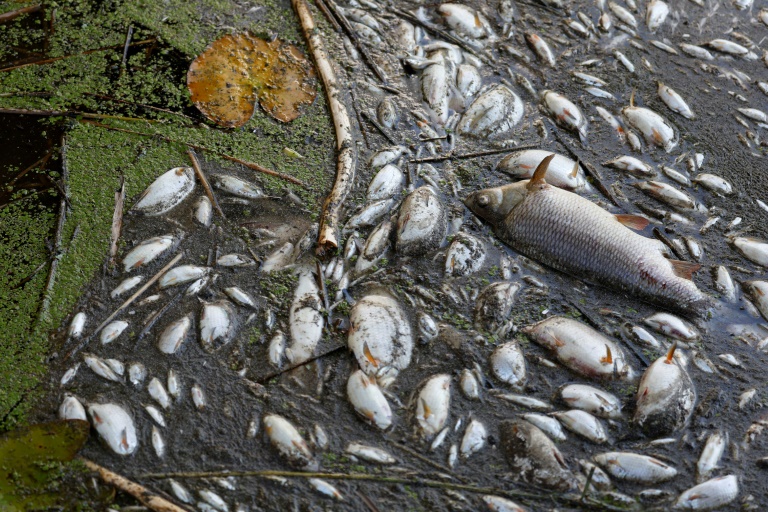Poland blames toxic algae for Oder river fish kill

Dead fish are seen along the banks of the Oder River in Schwedt, Germany on August 12, 2022, after a massive fish kill was discovered in the river in the country’s east
Warsaw – Polish authorities on Thursday said toxic algae was to blame for mass fish deaths in the Oder river, ruling out industrial pollution as the cause.
The conclusions presented at a press conference by scientists and government officials come from a preliminary report to be released Friday, weeks after the environmental disaster unfolded.
The authors of the report said nearly 250 tonnes of dead fish were recovered from the Oder river that runs through Poland and Germany.
Various factors “led us to conclude that the fish deaths were probably caused by the toxic effects of an algal bloom”, said Agnieszka Kolada from the Polish Institute of Environmental Protection.
The micro-algae at issue — known as Prymnesium parvum, or golden alga — are prevalent in estuaries and normally grow in brackish water, mainly near the sea, and “had until now never been detected in Poland”, she told reporters.
She added that the water quality of the Oder has been poor “for years” and was only made worse this summer by high temperatures and very low water levels, which may have fostered the algal bloom.
Some observers, including media outlets and environmental organisations, suspected that a chemical spill was at fault for the disaster, but the Polish side rejected that theory.
“The fish deaths were neither caused by heavy metals, nor pesticides, nor petroleum substances,” according to a presentation on the report.
According to the analyses to date, “none of the inspected business entities had discharged pollutants above the regulatory limits” into the river, said Andrzej Szweda-Lewandowski, the government’s head of environmental protection.
The amount of industrial discharge had been “the same as in previous years”, he told reporters.
Fishermen in Poland first started reporting dead fish in the Oder in late July and they began washing up in Germany a few days later.
